

Mass Gatherings
What is WHO's role in mass gatherings? What is a mass gathering?
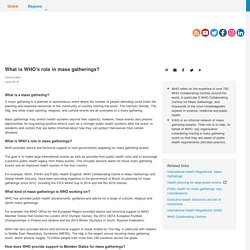
A mass gathering is a planned or spontaneous event where the number of people attending could strain the planning and response resources of the community or country hosting the event. The Olympic Games, The Hajj, and other major sporting, religious, and cultural events are all examples of a mass gathering. Mass gatherings may stretch health systems beyond their capacity; however, these events also present opportunities for long-lasting positive effects such as a stronger public health systems after the event, or residents and visitors that are better informed about how they can protect themselves from certain diseases.
Risk management mass gatherings december2017. Mass gatherings. WHO HSE GCR 2015.5 eng. National Drug Strategy Household Survey 2016: detailed findings, Table of contents. Travelers to the FIFA world cup 2014 in Brazil: Health risks related to mass gatherings/sports events and implications for the Summer Olympic Games in Rio de Janeiro in 2016. Reducing risks to health and wellbeing at mass gatherings: the role of the Sendai Framework for Disaster Risk Reduction. 1.
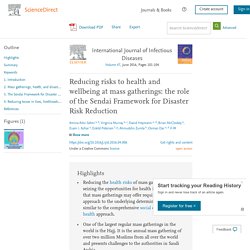
Introduction Mass gatherings of people at religious pilgrimages and sporting events are linked to numerous health hazards and accidents.1, 2, 3, 4 Traditionally, attention from public health authorities has focused on the transmission of infectious diseases, their impact on local health systems and services, and the threat to global health security of those with epidemic potential.5, 6, 7 The World Health Organization (WHO) defines a mass gathering as “An organized or unplanned event where the number of people attending is sufficient to strain the planning and response resources of the community, state or nation hosting the event”.8 Events at religious pilgrimage sites, sports facilities, air shows, musical festivals, political rallies, and other events that attract crowds vary in their complexity and demand for medical services and can lead to losses in lives, livelihoods, and health in the event of failure to cope with health hazards in emergency situations.9.
Crowd and environmental management during mass gatherings. Introducing a Risk Assessment Model for Sport Venues – The Sport Journal. Submitted by: Stacey Hall, Lou Marciani, Walter E.

Cooper & Robert Rolen Abstract: With the ‘unknown certainty’ of terrorist actions and fan behavior, it is impossible to ensure a risk-free environment at America’s sporting venues. Global perspectives for prevention of infectious diseases associated with mass gatherings. âWorth the test?â Pragmatism, pill testing and drug policy in Australia. The question of how pill testing would fit within the NDS is thought-provoking because arguably, it could already.
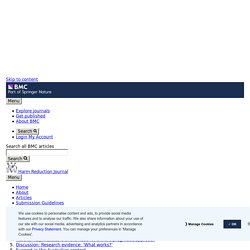
The NDS outlines Australia’s response to alcohol, tobacco and other (illicit) drugs and provides a national framework for coordinated action to limit their use and associated harms [1]. The strategy has been committed to this approach since its inception in 1985, established then as the National Campaign Against Drug Abuse (NCADA). JMIR - Detecting Disease Outbreaks in Mass Gatherings Using Internet Data. Introduction Background Historically, infectious diseases have devastated societies.
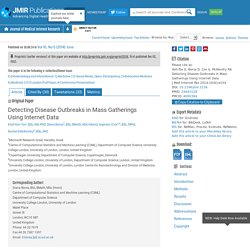
Examples include the “Black Death” bubonic plague of the 14th century in which between 30-40% of Europe’s population is estimated to have died [], and the influenza epidemic of 1918-1920, in which as many as 50 million are estimated to have died []. Despite very significant advances in medicine, infectious diseases remain potentially very serious threats to society. For example, a pandemic influenza is rated as the greatest national risk on the UK government risk register [].
Public Health Surveillance and Hajj Pilgrimage as a Mass Gathering. Should cities hosting mass gatherings invest in public health surveillance and planning? Reflections from a decade of mass gatherings in Sydney, Australia. Mass gatherings and mass gatherings health. Weather and Environmental Hazards at Mass Gatherings. Communicable diseases as health risks at mass gatherings other than Hajj: what is the evidence?
World Health OrganizationPublic health for mass gatherings: key considerations WHO, Geneva, Switzerland (2015) I.

Abubakar, P. Gautret, G.W. Brunette, L. Lancet Infect Dis, 12 (2012), pp. 66-74 Z.A. Lancet, 383 (2014), pp. 2073-2082 M. East Mediterr Health J, 19 (Suppl 2) (2013), pp. F. East Mediterr Health J, 19 (Suppl 2) (2013), pp. S. East Mediterr Health J, 19 (Suppl 2) (2013), pp. M. East Mediterr Health J, 19 (Suppl 2) (2013), pp. Infectious Diseases and Mass Gatherings. Disasters at Mass Gatherings: Lessons from History. London Marathon: How do you reduce the environmental impact? Image copyright Getty Images Tens of thousands of runners will take part in the London Marathon on Sunday - a gruelling 26.2-mile race around the capital.
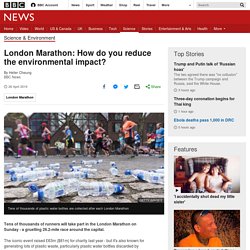
The iconic event raised £63m ($81m) for charity last year - but it's also known for generating lots of plastic waste, particularly plastic water bottles discarded by runners. Like concerts and other major events, the marathon also generates a massive carbon footprint with thousands travelling - some by plane - to the location. Waste from food, packaging and goodie bags gets left behind by spectators and runners. London Marathon champions use of seaweed water pouches. The London Marathon took place just yesterday in the capital city, creating an infectious buzz of support for this year’s batch of runners as streets flooded with cheering family and friends.
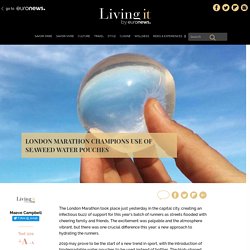
The excitement was palpable and the atmosphere vibrant, but there was one crucial difference this year: a new approach to hydrating the runners. Festivals and the environmental sustainability challenge. Festivals are fun activities - we go to meet up with friends and family, escape the hum drum of daily life, and to be exposed to new cultural forms or simply to be entertained.
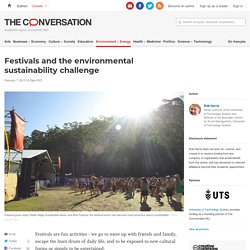
Rarely do we consider the demands our attendance makes on our environment, yet like all human activities festivals require resources – water, energy, land, equipment, food and products of various types. Given that many festivals, even at the local level, can involve thousands of attendees these requirements bring with them the potential for negative environmental impacts.
The Olympics as a Story of Risk Management. Can you really have a plastic free music festival? This one in WA proves you can - Hack - triple j. If you've ever gone to a music festival, you're probably used to the sight of plastic and rubbish littered around the place.

You might think rubbish debris is just an inevitability of these events. After pictures emerged of the aftermath of Splendour In The Grass this year - with rubbish, plastics and even tents left at the Byron Bay campgrounds - it's hard to imagine a 'clean, green' festival. Unless you head to Wave Rock Weekender. What-is-pill-testing-20190103-p50pg5. Here's why doctors are backing pill testing at music festivals across Australia. For many years experts in the field of drug policy in Australia have known existing policies are failing. Crude messages (calls for total abstinence: “just say no to drugs”) and even cruder enforcement strategies (harsher penalties, criminalisation of drug users) have had no impact on the use of drugs or the extent of their harmful effects on the community.
Whether we like it or not, drug use is common in our society, especially among young people. Can-a-music-festival-be-100-percent-sustainable-7-creative-ways-festivals-are-getting-close. When it comes to eating sustainably at a festival, all the same real-life principles apply: Organic, local, and vegetable-focused meals are the least environmentally damaging. And festival goers are starting to demand it! According to A Greener Festival, 72 percent think festival organizers should ban the sale of overfished seafood that has been caught using damaging methods. And 83 percent would choose free-range eggs if given the choice, and 80 percent would prefer to eat meat that was raised humanely. Many festivals now have at least one or two organic, healthful options, but some go above and beyond. Why Contiki will no longer take you to running of the bulls - Hack - triple j. There was a time not long ago when watching a bull rampage through the cobbled streets of Pamplona was a must for every young backpacker.
The running of the bulls is an annual event where a small group of cattle are let loose in a sectioned-off area of the Spanish town. Can music festivals go green? Image copyright Getty Images When people are rushing between headliners at festivals, the last thing on their minds might be how to recycle their food containers, or where they put their reusable cup.
Environmental Impacts of Tourism. Negative impacts from tourism occur when the level of visitor use is greater than the environment's ability to cope with this use within the acceptable limits of change. Uncontrolled conventional tourism poses potential threats to many natural areas around the world. It can put enormous pressure on an area and lead to impacts such as soil erosion, increased pollution, discharges into the sea, natural habitat loss, increased pressure on endangered species and heightened vulnerability to forest fires. What Are Some of the Positive and Negative Impacts of Tourism? Six reasons why mass tourism is unsustainable. "You never change things by fighting the existing reality.To change something, build a new model that makes the existing model obsolete. " -- Buckminster Fuller Despite the slow but steady increase in the number of enterprises claiming to be responsible or green, the fact remains that the current system of mass international tourism is utterly unsustainable.
Boston Marathon Terror Attack Fast Facts. Facts:The bombs exploded 12 seconds apart near the marathon's finish line on Boylston Street. Time. Falls Festival: Crowd stampede at Lorne leaves up to 80 people injured. Updated 31 Dec 2016, 3:55pmSat 31 Dec 2016, 3:55pm Festival-goers were crushed, left gasping for air and unconscious during a chaotic crowd stampede at the Falls Festival in Lorne on Victoria's south-west coast, witnesses say.
Key points: Viewing And Attendance Records Smashed For Australian Open 2019 - Ministry of Sport. How the first Coachella upended the festival business. Sustainability in Action: Making Big Events Green Events. 403 Forbidden. Sustainability. Innovative communication guidelines for mass gatherings – LETSCROWD. How Long It Takes For Trash To Decompose. VIC State Branch. VIC Carbon Committee The VIC Carbon Committee is a working group of the Waste Management and Resource Recovery Association of Australia (WMRR). The Group provides support, information, advocacy and leadership to waste industry professionals who have an interest in carbon policy issues. Objectives of the working group are: To share knowledge on key issues and developments relating to Carbon Policy for the waste and resource recovery industry To be an open channel of communication between facility operators, regulators and other stakeholders To inform and influence policy on issues relating to Carbon in VIC Contribute to the development and promotion of an understanding of Carbon issues within the waste profession and the wider community in VIC To provide input into national issues through the WMRR National Carbon Committee Membership of the VIC Carbon Committee is open to all financial members of WMRR.
Concerts and Mass Gathering Guidelines.